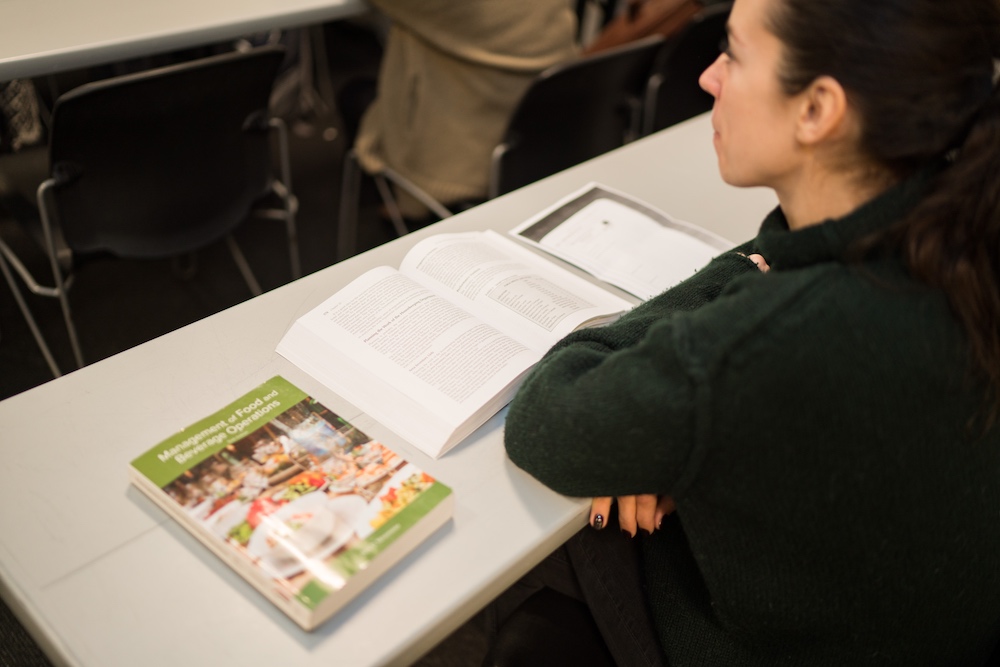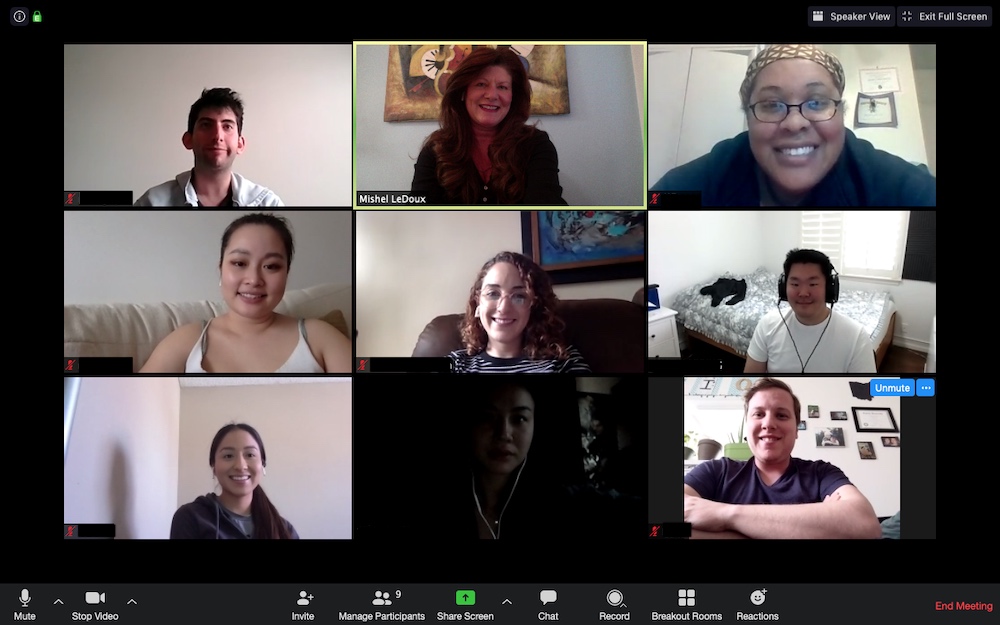The Institute of Culinary Education’s Restaurant & Culinary Management program is aimed at those interested in a rewarding career in restaurant management or who wish to launch their own food business — and now the dynamic curriculum is being taught online.
ICE’s Los Angeles campus shifted to distance learning in keeping with California’s stay-at-home order on March 24, and the New York campus came online today, along with Hospitality & Hotel Management classes.
In L.A., Director of Restaurant & Hospitality Management Mishel LeDoux redesigned the lesson plans for the digital version of the program. “The approach is similar, though the strategies are slightly different,” she says. Rather than meeting in person at the Pasadena campus, students login to a Zoom classroom. “Everything has to be more systematic and the activities have to be structured.” Classes resumed meeting at the regularly scheduled times.
The new classroom arrangement is not without some adaptations, the first being varying time zones among participants. “Several of the students went back home,” Mishel explains. “I have one student who returned to Monterrey, Mexico, one who went to Ohio, one in Santa Cruz and one in San Francisco.” Not to mention, a few students hoped this would be a short, temporary disruption and did not travel home with their books. Thankfully, ICE’s textbook publisher, Wiley, was able to heed the call and provide digital access. “These companies have been great, they gave us the code for free,” Mishel says.

The majority of the enrolled students are adjusting seamlessly to the online format and others partook in one-on-one tutorials to acclimate. “Some techy students integrated extremely well,” Mishel says.
Her class recently completed the finance module, which culminates in a closed-book exam on analyzing a profit and loss (P&L) statement. “The style of testing may have to be adjusted,” Mishel says, given the access to online resources while learning at home. In-class quizzes are emailed in advance, multiple-choice questions have been minimized and a heavier balance of essay questions has been implemented.
In addition to Google documents and PowerPoint presentations using screen sharing, Mishel has experimented with Zoom’s breakout sessions. “Students are able to break off and have these great conversations,” she reports. “They can talk about a subject and then present it to all of us. That’s been interesting and cool.”

Logistics and learning materials aside, some areas of the curriculum require a little more creativity for execution with distance learning. “The beverage module is the hardest one to convert,” Mishel says. “Normally we do tastings.” For that, she has come up with a temporary solution. The nine-person class will soon have a beer expert dropping in as a virtual guest speaker to lead that lesson. Each student will obtain one variety of beer prior to the scheduled class time. Rather than taste a full flight, each will taste and describe the flavor profiles of their chosen beer and share descriptors of aromas on screen. “With lessons that are more tactile, I have to be creative with those learning mechanisms,” Mishel says. “We want to be sure students get the value and ensure the learning outcomes are what they need to be.”
One major change has been the class’s topics of current events, which have shifted away from restaurant openings, Michelin stars and James Beard Awards to entrepreneurial innovation and the fast-changing business models unfolding in real-time. “Now we’ve had to shift the conversation to what does it mean to have to lay off people, what does it mean to close, what does it mean to shift your business model to take-out, grab-and-go and curbside delivery when you used to focus on hospitality and fine dining?” says Mishel. “We’ve been talking about how important it is to operate in a really tight and efficient way,” she says. “Restaurants need to save up for rainy days like this, and if you know how to run your business really efficiently, when it comes to the hard times you will have a little money in the bank and it won’t be as devastating when you hit a rough patch.”
Despite not interacting in person, students are connected by the digital dialogue. “This group was very excited to see each other online,” Mishel says. “They all introduce their pets. You get to see a different side of the students. It’s a snapshot of their world and we all get to experience that together.”
There are four virtual Restaurant & Culinary Management classes taking place in the morning, afternoon and evening, with three new incoming classes beginning on April 14. “All of our instructors are enjoying being able to connect with their students,” Mishel says. “It’s a fulfilling moment to see them adapt to a new style of learning and to offer an outlet for them to come together in this kind of global crisis.”
Explore food business and entrepreneurship in ICE’s Restaurant & Culinary Management program.
Meet three ICE grads who started their own food businesses:
Dan Mezzalingua (Management, '15) created fast-casual chicken concept, Brine.
Dana Pollack (Pastry, '11) developed Dana's Bakery.
Eddie Mao (Management, '18) runs Mao Bao at NYC food markets like Smorgasburg.




